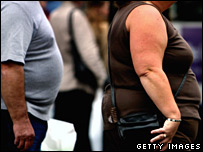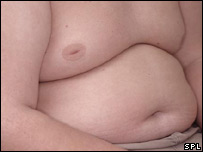
Obese and overweight people cost Britain nearly £7bn in 2002
|
We are getting fatter - and apparently it's society's fault.
A report has concluded that obesity is an inevitable consequence of our busy modern lives, which consist of convenience foods, labour-saving devices, motorised transport and sedentary work practices.
Essentially, 21st Century Britons are spending longer sitting in front of computer and TV screens, doing little exercise and eating the wrong kinds of food.
As a result, nearly a quarter of adults are now judged to be obese and if current trends continue, 60% of men, 50% of women, and 26% of children and young people will be obese by 2050.
Waist sizes
But, just 50 years ago, the picture of Britain's health was very different. Obesity statistics did not even exist - but research suggests we were significantly thinner and more active.
According to a 2004 study, women's average waist size was 27.5in (70cm) in 1951 compared with the current 34in.
 |
 We were sold that message that labour-saving was the way to go
We were sold that message that labour-saving was the way to go

|
Another suggested that 1950s women burned up three times as many calories as their modern counterparts, with many putting this down to the labour-intensive traditional female tasks of washing, ironing and walking to the shops.
These active lives partly explain why, when calorie intake was generally higher 50 years ago than today, people were slimmer.
But while the 1950s appear to many as healthy, it was in this post-war era that the seeds of today's obesity epidemic were sown, says Ken Fox, professor of exercise and health science at the University of Bristol.

Domestic work was much harder before labour-saving appliances
|
"It was in this period that active lifestyles began to decline," he says.
"This was a result of increasing technology and the introduction of lighter industries which started to take the place of heavy industries and agriculture. With that went hard labour."
Also, most people either cycled or walked to work.
"But then, in the 1950s, car ownership started to increase," says Professor Fox. "It became normal for households to consider having a car. This led to a decline in activity."
Easy life
Technology was also creeping into home life. Appliances such as washing machines and electric irons were making domestic tasks less labour intensive, and people were consequently burning off fewer calories.
"We were sold that message that labour-saving was the way to go," Professor Fox says.
"Around the house there was less energy expended. Also there were more attractive sedentary activities - especially when TV came along. We were seduced into taking life easier."
Changing diets have also played a part in changing the physical shape of the average Briton.
According to the British Nutrition Foundation, rationing during the war years meant many actually had a more balanced diet than they had had before.
Then, in the post-war period, because of the lack of refrigerators and freezers, people tended to shop every day, buying fresh produce.
"In those days, we ate healthily. Now we have fast foods and convenience foods. Mothers don't stay at home and do the shopping - people just grab what they can on the way home from the office. It is very different," says Tam Fry of the National Obesity Forum.
"We were consuming more calories, but burning them off quicker. Now we are eating fewer calories, but doing less exercise."
Daily clean
Life before washing machines and electric vacuum cleaners demanded much more work, says 84-year-old Margaret Severn, from Wheldrake, near York.
"I remember doing the nappies - it was hard work. I washed twice a week and it would take me half a day. I would clean the house every day, doing the floor with brushes and carpet sweepers."
As a young girl in Derbyshire, Mrs Severn would walk half-an-hour to school, and when she became a nurse and then ward sister, she took the bus and walked to work.
"We did a lot more walking then than people do now," she says.
But, what of the future? Will we remain in our sedentary ways?

The government wants children and adults to exercise more
|
Professor Fox believes we will always be reluctant to give up our comparatively easy lives.
"I cannot see that we will turn our backs on technology. We still have Victorian values - we reward ourselves after a working day with a sit down and a beer. I do that after a day in front of the computer.
"We have not adjusted to the notion that we have more sedentary lives."
However, Mr Fry says that although there may always be a level of obesity, it can be reduced with great effort from all parts of society.
"Every single government department in this country has to look to see what it can do to make this society in which we live a place where the family always takes responsibility for A: Keeping themselves in trim, and B: Keeping their children in trim."
Encouraging more people to participate in sport and recreation would be a major start, says Brigid Simmonds, chairman of the Central Council for Physical Recreation.
"It means helping to put in place an environment where being active is easier and more commonplace, and where taking exercise is the norm rather than the exception."


~RS~q~RS~~RS~z~RS~40~RS~)
Bookmark with:
What are these?